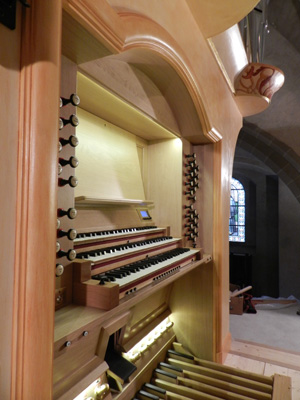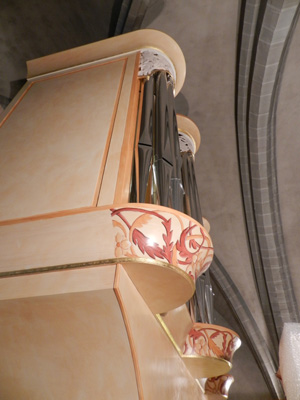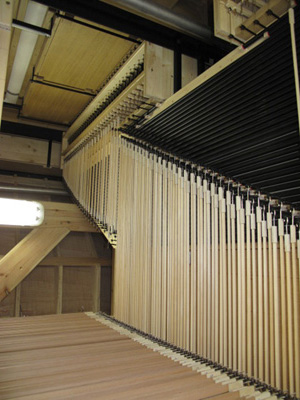

Organ : 3 keyboards , pedalboard - 43 stops

The cases :
The sketches of the case which we proposed, were drawn by referring to the traditional general forms of the French cases, ordered in turrets and flats. The proposal of polychromy, the mouluration, the shape of capitals, were designed, on the other hand, in a more free way.
The instrument is organized as usual for the main sound plans of the instrumental part : "positif de dos", Great Organ in two windchests and a part of the pedal plan at the upper level of lower case.
In the back and in the center of the case : Great Organ, the expressive "Récit" and, still behind this one, the plan of big Pedal.
Considering the relatively little height of the nave, the presence of big stops : Flute of 16p and mild Bombards or "Posaune" 16p (in real length), required to make the main facade of the Great-Organ rise up to the summit of the vault. These cases are in fir-tree, prepared for the polychromy. This polychromy alternates with golden parts. The pipe shades situated over the pipes are carved in wooden massifs of lime tree, tinged and varnished.
Composition :
| Positif - 61 notes | Grand-Orgue - 61 notes | Récit expessif - 61 notes | Pédale - 30 notes |
| Montre 4' | Bourdon 16' | Gambe 8' | Contrebasse 16' |
| Salicional 8' | Montre 8' | Flûte conique 8' | Posaune 16' |
| Bourdon 8' | Flûte harmonique 8' | Jeu céleste 8' | Bourdon 16' |
| Flûte allemande 4' | Prestant 4' | Flûte octaviante 4' | Quinte 10 2/3' |
| Nazard 2 2/3' | Quinte 2 2/3' | Octavin 2' | Flûte 8' |
| Flûte 2' | Doublette 2' | Flageolet harmonique 1' | Posaune 8' |
| Tierce 1 3/5' | Fourniture 2 rangs | Plein Jeu 3 rangs | Bourdon 8' |
| Larigot 1 1/3' | Plein Jeu 5 rangs | Basson 16' | Trompette 8' |
| Plein Jeu 5 rangs | Cornet 5' | Trompette harmonique 8' | Clairon 4' |
| Basson 8' | Trompette 8' | Hautbois 8' | |
| Cromorne 8' | Clairon 4' | Voix humaine 8' |
Couplers : Pos/GO, Solo/Pos, Solo/GO, Solo on itself in 16 and in 4
Pedalcoupler : Pos, GO et Récit - 3 Tremulants
Suspended mechanical action : GO, Pos, Solo. Two choices of couplers (electric or mechanical)
Electric action for the pedal.
Electronic Sequencer : « Eltec automazioni »
The musical project :
The objective was to create an instrument referring mainly to the "widened" French classic style.
This esthetic purpose joins in the history of the French organ evolution . This one being always made by a progressive adaptation of the original model and by evolving in parallel with the musical, polyphonic, classic, romantic, symphonic and modern language.
A part of foreign influences (Northern Germany , Spain, Italy etc.) also comes to modify the traditional habits and, each time, the organ adapts itself to the new musical sensibilities. As a consequence, we followed musical priorities that influenced the general conception of the organ.


